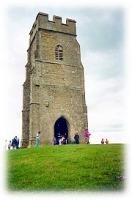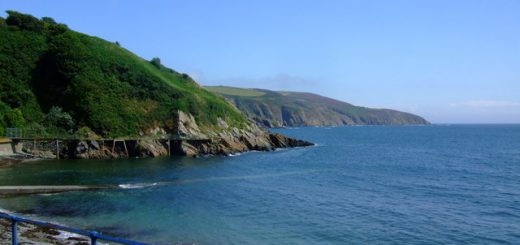Gormire Lake & White Mare Crag
Surrounded by the dense Garbutt Wood, Gormire Lake is the result of glacial activity and is one of the few natural lakes in Yorkshire. Gormire Lake has a few little known gems of folklore attached it. One tale involves a witch who was being chased across the moor. When she reached cliffs at White Mare Crag she took a running jump and landed in Gormire Lake, which according to legend is bottomless and hides a lost village in its watery depths. The witch was taken along in an underwater current and she eventually emerged from a well over nine miles away. There is a similar tale concerning a goose that was dropped into the lake from the cliffs. It too was caught in an underwater stream and supposedly emerged in Kirkbymoorside, which is twelve miles east of Gormire. The goose however had been stripped of all its feathers during its journey.
Another story concerning a leap from White Mare Crag can be found in “From Eden Vale to the plains of York or A Thousand Miles in the Valleys of the Nidd and Yore” written by Edmund Bogg and published around 1894. Bogg’s work tells the story of a race between the Abbot of Rievaulx Abbey and a local noble called Sir Harry de Scriven. The story is in verse, as told by Revd. Richard Abbay in “The Castle of Knaresborough” and by Revd. Thomas Parkinson, in his “Legends and Traditions”
The Abbot of Rievaulx was a man with more on his mind than his sacred duties. He was a man more interested in worldly possessions and one of his joys was his white Arab mare. A beautiful fast and strong animal.
“In a stall at the back of the Abbey there stood
A mare of the purest of Arab blood,
Brought from a distant land and given
By a knight to the abbot to aid him to heaven;
White as the falling snow, and fair
As the abbot’s lawn when he went to prayer,
Or the foam that leaps from the breaker in air;
White as the wild swan’s plumage bright,
Swift as the wild roe’s startled flight;
Freedom had fashioned each muscle and thew,
Freedom was coursing her limbs through and through
And the joyful life of earlier days
Still shone in her eyes at the abbot’s praise,
Those wondrous eyes of darkest hue,
That told of a heart undoubting and true,
To dare all a rider dare bid her to do;
But gentle and mild
As a little child,
Though full of old love for the desert wild.”
“Sir Harry came of Old Yorkshire stock,
The rarest chip of a rare old block;
The huntingest squire
In the huntingest shire,
His nerve never failed, his limbs would not tire;
A rollicking son of a rollicking sire.”
Sir Harry de Scriven also had an impressive steed, his black horse was called Nightwind.
” Though foremost far, yet far behind,
Sir Harry rode on old Nightwind ;
The brave black steed his rider knew,
Each was like each, of metal true.
A full score times with fatal speed
Had Nightwind ta’en and held the lead,
And hounds, Sir Harry, and his steed,
Alone had done the parlous deed.”
One evening after returning from hunt, Sir Harry, riding Nightwind came upon a popular hostelry on the plain of Black Hambleton. Sir Harry and the Abbot were somewhat jealous of each other.
“Not far from the spot where the stag had died
Was a hostel, well known o’er the country-side;
Old Ralph, the retainer, kept excellent fare,
And wondrous ale for the monks who came there.
“And here as Sir Harry was riding by,
In the parlour the abbot he chanced to spy,
Drinking and blinking,
And thinking and winking,
In his very bright way, with his very
bright eye.
Sir Harry drew rein,
In a frolicsome vein,
To make the good abbot his conduct explain.”
Nightwind was stabled in the same next to the Abbots Arab mare whilst Sir Harry when to speak with the clergyman. Time passed and soon it was dark. Then Sir Harry remembered that he had been asked to seek the Abbots help for a sick yeoman. He required the Abbot to attend him and pray for his soul urgently.
“My lord abbot, I hear that a yeoman is sick
On Hambleton Moor, and he prays you’ll be quick,
And shrive him, poor sinner, and get him to heaven,
For he’s carded and diced and played odd and even;
His wife, by-the-by, has the beauty of seven.
I’ll show you the track, my lord abbot, and lend you
Old Nightwind, and pray that the gods may defend you.
Then aside to himself, ‘ Old Nightwind is wiser
Than carry the abbot; he’ll get a surpriser.’
Then the abbot was urgent to visit the sick;
Sir Harry was charmed, and called him a brick,
But inwardly smiled at the fun of his trick,
And, under his breath, wished him soon with old Nick.
The abbot was urgent; no time was to spare;
The knight should not walk, if his journey he’d share;
Sir Harry should ride on the white Arab mare.
Then they mounted in haste, and the frolic begun;
The mare, like her rider, was full of the fun;
She capered and danced,
Curvetted and pranced,
And thought to herself,
There’s a race to be run. ‘
With a touch of the spur and jerk of the rein,
Sir Harry and she tore over the plain;
But though he rode fast,
Sir Harry was last;
Old Nightwind, it seemed, could not be surpassed,
And ride as he would,
The abbot so shrewd
Was still at his side with a neck to the good;
And the abbot so stout,
So far round about,
Seemed like a feather,
And stuck to the leather
As if Nightwind and he had been soldered together,
And carelessly turned in his saddle and beckoned,
To intimate plainly the pace should be quickened.
Then all that she knew,
That Arab did do,
And Sir Harry was in a most wonderful stew,
As he thought with the abbot he had not quite leckoned,
But he rode with the jock who had never been second.
Sir Harry grew wilder, and wilder, and wilder;
He swore at the mare, and loudly reviled her;
He swore at the abbot in wrathful surprise;
He swore at himself, he swore at his eyes,
And seemed as if blind,
Or out of his mind,
As new was the feeling of riding behind
Such a corpulent cleric ;
It made him choleric,
And roused up sensations akin to hysteric.
So the knight never knew,
As nearer they drew
To that terrible spot where Hambleton Heath
Breaks off in a cliff to the valley beneath;
Eight hundred feet sheer by plummet-line sounded,
And nought but some heather the precipice bounded.
‘Tis a terrible cliff; e’en the stoutest grow pale,
As they stand on the brink and look down the vale.
To the edge of this cliff race blindly the pair;
Too late ! they are over ! They gallop in air!
‘Tis the last leap he’ll take on that brave Arab mare.
Down, down to the rocks ; ’twas a terrible sight!
And the knight never knew how he ended the night;
For his quick-rushing breath
Was stifled in death
Ere he reached the sharp rocks of the valley beneath.
But a strange sight he saw in process of dying:
Far over his head old Nightwind was flying;
And a long pointed tail o’er his haunches was flowing;
Two horns on the head of the abbot were growing;
And his feet cleft in twain in the stirrups were showing;
And a very harsh voice in jubilant tones
Cried, ‘ Sir Harry de Scriven, beware of the stones,
But a novice, like you, must expect broken bones;
If you mutt play a trick,
Don’t try on old Nick;
I’ll see you below when I visit the sick.’
Then into the tarn, half a mile from the precipice,
The abbot and Nightwind popped with, you’ll guess,
a hiss.
And the waters of Gormire, once sparkling and bright,
To the blackness of ink were changed in that night;
But whether because of the abbot or Nightwind,
Tho’ I’ve searched all the records I never could quite find.
But the cliff where the white mare met such disaster
Was bleached suddenly white as the lawn of her master.
And still the good folks of the valley below,
When the mist like a curtain hangs from the brow
Of the white steep, declare
That a terrified mare
Will leap from the cliff, and melt into air.”





Recent Comments